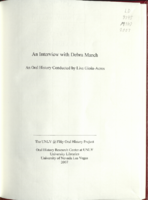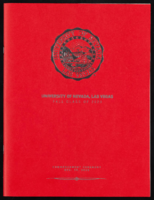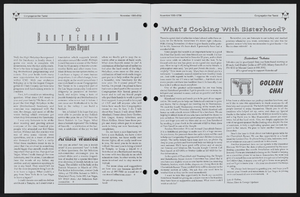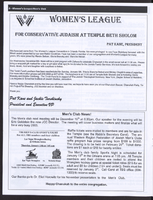Search the Special Collections and Archives Portal
Search Results
Margie Llorente Gonzales oral history interview
Identifier
Abstract
Oral history interview with Marietta "Margie" Llorente Gonzales conducted by Cecilia Winchell, Vanessa Concepcion, and Stefani Evans on November 1 and 22, 2021 for Reflections: The Las Vegas Asian American and Pacific Islander Oral History Project. Margie Llorente-Gonzales discusses her upbringing in Manila, the Philippines and her family history within the country, recalling the lives of her parents, grandparents, and great grandparents. She talks about her childhood, educational pursuits, and courtship with her husband in the Philippines. Margie shares how she and her husband immigrated to the United States, how she adapted to her new life as an immigrant dependent on her extended family, and how she and her husband came to settle in Las Vegas. She talks about her artistic pursuits in the forms of dance choreography and performing, scriptwriting, broadcasting, and publishing newsletters. Margie also discusses her employment at McCarran Airport and her political activism, canvassing, and committee work in the Philippines and the United States.
Archival Collection

Transcript of interview with Debra March by Lisa Gioia-Acres, February 21, 2007
Date
Archival Collection
Description
Text

Roadrunners Internationale Contractor's Forum, October 6, 2005
Date
Archival Collection
Description
Text

University of Nevada, Las Vegas (UNLV) Fall 2020 commencement program
Date
Archival Collection
Description
Commencement program from University of Nevada, Las Vegas Commencement Programs and Graduation Lists (UA-00115).
Text

Patricia Vazquez interview, November 14, 2018, June 14, 2019: transcript
Date
Archival Collection
Description
Session 1: Interviewed by Marcela Rodriguez-Campo. Barbara Tabach also participates in the questioning. Session 2: Interviewed by Rodrigo Vazquez. Monserrath Hernandez also participates in the questioning. Patricia Vazquez was born and raised in Las Vegas, NV and shares her experiences growing up in the Valley as a Queer Latina. At a young age, she remembers traveling back and forth between Mexico and the U.S. to visit family. When she started school she shares how her home language, Spanish, became her family's "secret language" as she began to learn English. During elementary school Patricia was tracked into the special education program, and remove from the mainstream classroom. She would find her love for learning in books and libraries as she taught herself how to read in English. Despite being tracked into less advanced courses, Patricia would end up taking AP/ Honors courses in high school after forging her favorite teachers signature, which changed her educational trajectory. After coming out to her family, Patricia went nearly a decade distanced from her mother and continued her college education at Arizona State University. There, she would complete a bachelors in painting and a masters in comparative literature. Her work with the Chicano Studies program at ASU helped her develop her Chicana identity and begin her involvement in social activism. In Las Vegas, she worked to fight for marriage equality and LGBTQ rights with the American Civil Liberties Union , and later with the Progressive Leadership Alliance of Nevada. She also conducted several lectures for the Latino Youth Leadership Conference on sexuality, gender, and homophobia for over a decade. She has served as an English Professor at the College of Southern Nevada for the last 20 years and is an avid hiker, traveler, and painter.
Text





